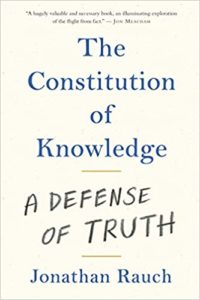How do we know what we know, or what we think we know? If you ask the guest in this episode, he’ll tell you most of what you think you know is wrong. And not just a little, but way wrong. Host Russ Roberts welcomed Jonathan Rauch to talk about his latest book, The Constitution of Knowledge. This constitution, says Rauch, is “our system, collectively as a society, for figuring out what’s true and what’s not true, and doing that in a way that respects our freedom, and keeps us sane, and keeps us civil.” It has much in common with the market process and written forms like the US Constitution. (I’d be interested to hear which you think it has more in common with…)
The Constitution of Knowledge comes from four sources: research (i.e., academia and science), journalism, law, and government. It’s built on informal norms, and its institutions are being too heavily taxed today, says Rauch. So what forces are at work to undermine the Constitution of Knowledge, and why isn’t free speech enough to keep is safe? Let’s hear what you think!

1- How does the “epistemic funnel” work to create the Constitution of Knowledge? What steps must be followed in the epistemic funnel, and what role does free speech play? And, as Rauch asks, “How can a society find that small fraction of 1% of people’s ideas that actually advance knowledge?
2- Why have journalists become openly partisan over last 20 years? How do Roberts’ and Rauch’s views differ on this question, and what do they suggest as possible solutions? How plausible do you think their suggestions are? To what extent do you buy Rauch’s argument that we’ve fought this battle (and won) before- especially in 19th century journalism?
3- Rauch says, “This is the biggest message of my book. The notion of a marketplace of ideas in which free speech is enough, and everything else is self-maintaining is completely wrong.” What does he mean by this?
4- Roberts notes the role of US Constitution in restraining certain political outcomes. What analogies are there for the Constitution of Knowledge? How do the two final ideas Rauch and Roberts discuss- “no final say” and “no personal authority” fit in here? And how might these last two ideas be applied to our personal lives, as Roberts suggests?
5- What can be done to reverse the damage that’s been done to the Constitution of Knowledge? Rauch says, “optimism is too complacent, but pessimism is too fatalistic, and in between is hope.” Are you more optimistic or pessimistic about the future of the Constitution of Knowledge?


Comments are closed.